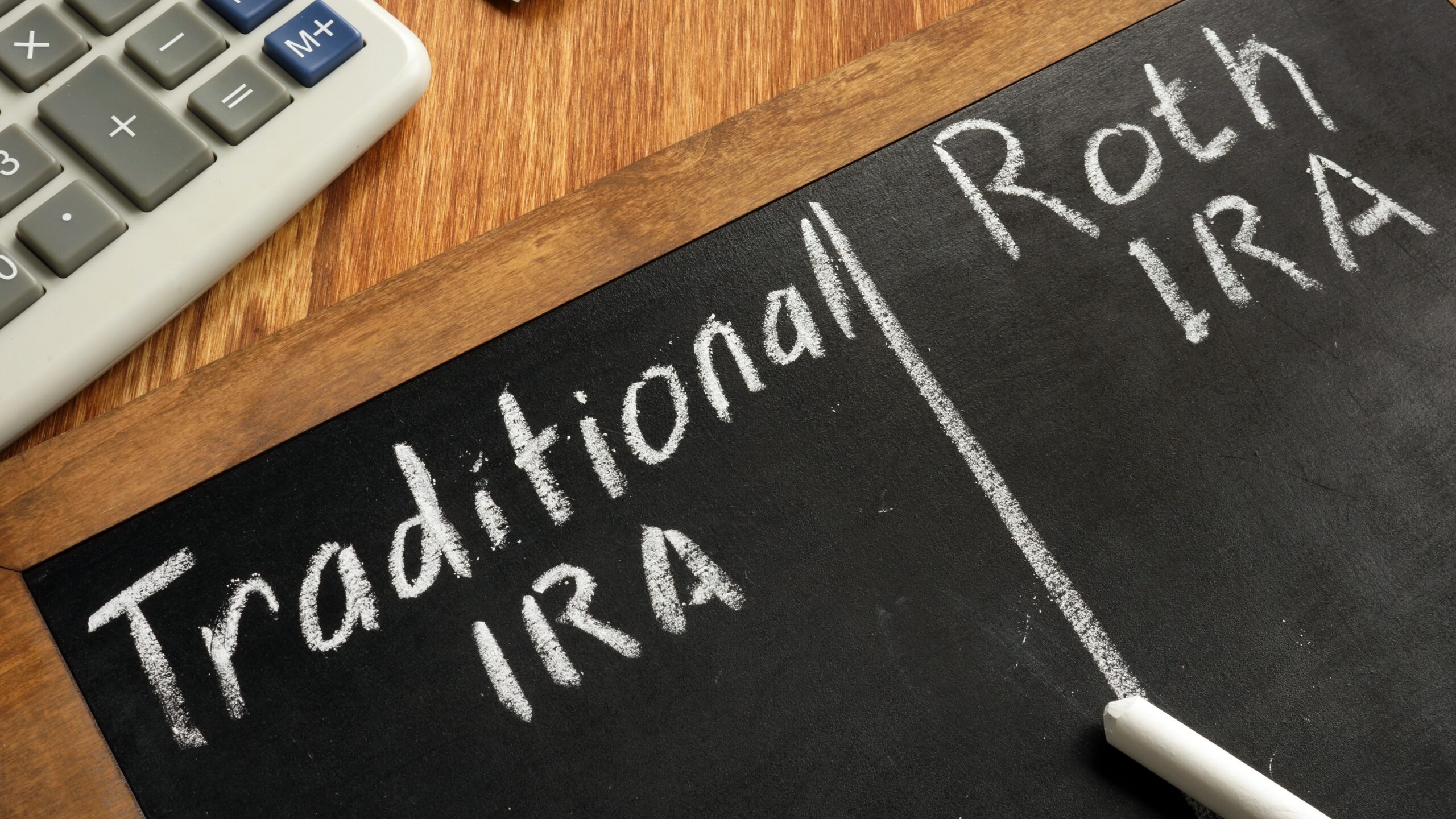For many nearing or in retirement, maximizing their retirement income while minimizing their tax burden is a top priority. One strategy that can be particularly attractive is a Roth IRA conversion. But is a Roth conversion right for you? Understanding the factors at play and the potential benefits and drawbacks is crucial before deciding.
Traditional IRA vs. Roth IRA: Key Differences
Traditional IRAs and Roth IRAs offer distinct advantages depending on your tax situation and retirement goals. Here’s a quick breakdown:

Traditional IRA: Contributions may be tax-deductible in the year you make them, but withdrawals in retirement are taxed as ordinary income.
Roth IRA: Contributions are made with after-tax dollars, but qualified withdrawals in retirement are generally tax-free and penalty-free. Think of a Roth IRA like a bucket you pay taxes on now, but all the money inside grows tax-free, and you can withdraw it tax-free in retirement.
Why a Roth IRA Conversion Can Be a Smart Strategy
A Roth IRA conversion can be a powerful tool for tax-efficient retirement planning, and here’s why you should consider it:
- Outsmart Future Tax Hikes & RMDs: Many people overfund tax-deferred accounts like 401(k)s and traditional IRAs, assuming lower taxes in retirement. But future rates could be higher, and Required Minimum Distributions (RMDs) force withdrawals that might bump you into a higher bracket. A Roth IRA conversion may help lock in today’s potentially lower tax rates and reduce RMDs for more control over your retirement income and tax planning. It’s important to address opportunities now before the anticipated 2026 tax law change. Imagine paying taxes on your contributions at a lower rate today and enjoying tax-free growth and withdrawals later!
- Greater Flexibility in Retirement: With a Roth IRA, you generally have more flexibility in accessing your funds in retirement. Qualified withdrawals are tax-free and penalty-free after a five-year waiting period, unlike Traditional IRAs which are taxed as ordinary income upon withdrawal and subject to RMDs. This can provide greater control over your retirement income and tax bracket, and potentially allow you to access funds for emergencies or unexpected expenses without tax consequences.
- Tax-Free Legacy for Heirs: Any funds remaining in your Roth IRA after your passing can be inherited by your heirs tax-free, potentially providing a valuable financial benefit for future generations. This is not the case with Traditional IRAs, where beneficiaries can owe income tax on withdrawals and potentially be subject to an accelerated withdrawal schedule in their prime earning years.
- More Control Over Your Tax Burden in Retirement: Having a tax-diversified portfolio can allow you more control over which tax-advantaged accounts you pull your income from in retirement. This can help you steer your retirement resources toward lower long-term tax exposure and minimize the chance of increasing RMDs, which could force you into a higher tax bracket.
Considering a Roth Conversion: When it Might Make Sense
Here are some factors to consider when evaluating if a Roth conversion is right for you:
- Your Current Tax Bracket: As mentioned previously, if you’re in a lower tax bracket now than you expect to be in retirement, a Roth conversion can be highly advantageous.
- Future Income Sources: If you anticipate having significant taxable income sources in retirement, such as pensions, Social Security or continued work, a Roth IRA with tax-free withdrawals can be a significant benefit.
- Retirement Age and Time Horizon: Roth conversions typically require a five-year waiting period before qualified withdrawals of the earnings can be made tax-free. This strategy is generally more suitable for those with either a long-term horizon until retirement or a long life expectancy.
Potential Drawbacks of Roth Conversions
While Roth conversions offer potential tax advantages, there are also some drawbacks to consider:
- Upfront Tax Bill: The converted amount is considered income for tax purposes in the year of conversion. This could potentially bump you into a higher tax bracket for that year.
- Loss of Deduction Benefit: You can’t deduct contributions to a Roth IRA (contributions are made with after-tax dollars).
- Reduced Short-Term Access to Funds: There’s a five-year waiting period before qualified Roth IRA withdrawals of earnings can be made tax-free. This may limit your access to these funds in the short-term.
Navigating a Roth Conversion with McAdam Financial
A Roth conversion can be a powerful tool for tax-efficient retirement planning, but it’s not a one-size-fits-all solution. Here’s how McAdam Financial can help:
- Personalized Evaluation: Our team of retirement draw-down specialists can analyze your current tax situation, retirement goals, and projected future income to determine if a Roth conversion is the right strategy for you.
- Tax Implications Assessment: We’ll help you understand the potential Roth IRA conversion tax implications, including the impact on your current tax bracket and future withdrawals.
- Holistic Retirement Planning: We don’t view a Roth conversion in isolation. A carefully considered strategic distribution plan is critical in keeping more of what you have made in your lifetime. We’ll integrate this strategy into your overall retirement plan, considering other factors like your risk tolerance and investment portfolio.
- Ongoing Guidance: The financial landscape can change. McAdam Financial can provide ongoing monitoring and adjustments to your retirement plan, ensuring it remains aligned with your evolving needs and potential changes in tax laws or Medicare regulations.
- Free Retirement Tax Calculator: Use our free retirement tax calculator to get a personalized estimate of how a Roth IRA conversion might impact your retirement income and tax burden. This calculator can help you answer:
- Will a Roth conversion save me money on taxes in retirement?
- How much could my Roth IRA grow over time?
- Will I have enough income to cover my expenses in retirement?
Taking Control of Your Retirement Future with McAdam Financial
By understanding the potential benefits and drawbacks of Roth conversions and partnering with a fiduciary financial advisor from McAdam Financial, you can make informed decisions about your retirement savings and navigate the conversion process with confidence. We can help you maximize your retirement income and minimize tax burdens, ensuring a secure and fulfilling future.
Here’s why McAdam Financial is the Perfect Partner for Your Roth IRA Conversion Journey:
- Expert Guidance: Our team of qualified financial advisors has extensive experience in navigating Roth conversions and other tax-efficient retirement planning strategies. We’ll provide clear and actionable guidance in everyday speak that’s tailored to your unique circumstances.
- Tax-Savvy Approach: We understand the complexities of tax implications associated with Roth conversions. We’ll work with you to help minimize your tax burden and help maximize the long-term benefits of this strategy.
- Comprehensive Planning: A Roth conversion is just one piece of the puzzle. We’ll integrate it seamlessly into your overall holistic retirement plan, considering factors like Social Security claiming strategies, potential health care costs and your desired retirement lifestyle.
- Confidence and Clarity: We believe knowledge is power. We’ll educate you on the entire Roth conversion process, empowering you to make informed decisions throughout your retirement journey.
Schedule Your FREE Consultation Today!
Discuss your retirement income strategy and explore if a Roth conversion is right for you. Contact McAdam Financial today. We offer complimentary consultations to help you understand your options and create a personalized plan for a secure retirement.
Call 855-MCADAM5 now! Or click to schedule your consultation online.
Don’t wait to take control of your financial future. Impending tax law change is already on the horizon for 2026. Let McAdam Financial help you take advantage of these opportunities now that could potentially save you hundreds of thousands of dollars in taxes over the course of your lifetime.
Written by McAdam Financial as of 6/18/24. This article is provided by McAdam LLC (“McAdam” or the “Firm”) for informational purposes only. Investing involves the risk of loss and investors should be prepared to bear potential losses. Past performance may not be indicative of future results and may have been impacted by events and economic conditions that will not prevail in the future. No portion of this article is to be construed as a solicitation to buy or sell a security or the provision of personalized investment, tax, or legal advice. Certain information contained in this report is derived from sources that McAdam believes to be reliable; however, the Firm does not guarantee the accuracy or timeliness of such information and assumes no liability for any resulting damages. Any references made regarding the taxable nature of your investments should not be construed as tax advice. McAdam LLC is not a tax advisory firm; therefore, any tax decisions or assumptions should be made/verified with your tax professional. Effective tax rates are based off the 2024 tax table and determined using www.irs.gov/filing/federal-income-tax-rates-and-brackets.
Securities offered only by duly registered individuals through Madison Avenue Securities, LLC (MAS), member FINRA/SIPC. Investment advisory services offered only by duly registered individuals of McAdam, LLC, a registered investment advisor. Insurance products and services offered through McAdam Financial. McAdam, LLC and McAdam Financial are not affiliated with MAS.


